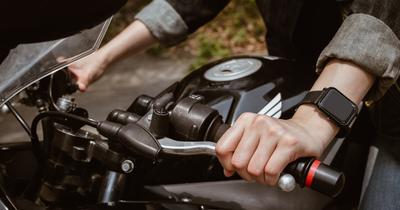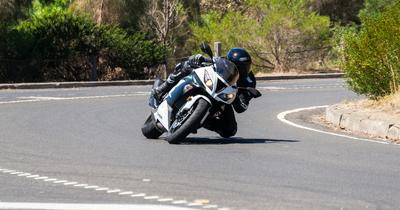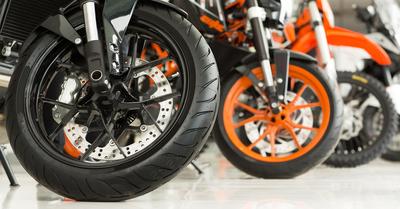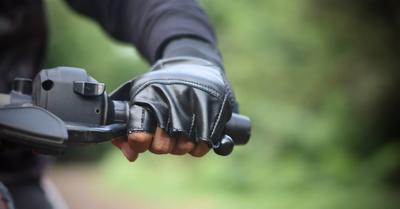How To Strap A Motorcycle Helmet
Unlike a bicycle helmet, motorcycle helmets don’t secure with a buckle that can be quickly released. Instead, motorcycle helmets use a strap that secures with a double D-ring. The rings provide tension against themselves when tightened, which prevents the strap from tightening or loosening up during your ride.
While this is great, it means that new riders may fail to understand how to tighten down their helmet correctly, and a helmet that is not secure does not adequately protect the rider.
How Should a Motorcycle Helmet Fit?
A few factors to consider regarding fitment when buying a motorcycle helmet exist. Proper helmet fitment is an especially important part of the helmet-buying process because a properly fitting helmet provides the highest level of protection.
The National Highway Traffic Safety Administration (NHTSA) publishes regular studies on motorcycle accidents and helmet use. In 2020 they published this study which showcased, among other things, that 40% of crashes involving motorcyclist fatalities involved un-helmeted riders.
Additionally, the NHTSA published a 2017 study that ascertained the approximate percentage of savings in the number of lives that helmet-wearing could have prevented from being fatal. They estimate that 1,872 lives were saved from helmet usage, while another 749 could have been if they were wearing helmets.
The NHTSA has published a guide on proper helmet fitment, which breaks it down into shape, size, and style.
The shape of the helmet refers to the overall shape of the shell. Everyone’s head is shaped a little differently, so helmets are shaped accordingly. The three shapes of helmets are round oval, intermediate oval, and long oval, with intermediate oval being the most common head shape.
Size is the measurement around your head. Using a cloth measuring tape, take your measurement starting at just above your eyebrows and going around the thickest part of your head. You’ll need to cross-reference these measurements against the manufacturer’s size chart to know which size to choose, but you want a fitment that is a little tight with even pressure around your head.
The last point that the NHTSA makes regarding helmet fitment is style. Style doesn’t refer to the cool racer graphics on the side of your helmet but rather the different styles of helmets available. Helmets range from half to full-face helmets. Generally speaking, full-face helmets provide superior protection from all categories of injury.
Strapping In
Now that we know we have a proper-fitting helmet, that brings us back to our original question of how exactly do you strap it on to ensure it is secure and provides the best protection possible.
I’ve got my helmet in front of me as I type, and I will walk you through the step-by-step process of putting it on and securing it. So If you’d like to imagine me sitting at my desk typing this while wearing a full-face motorcycle helmet, do feel free to because that’s exactly what’s happening.
Step 1: Put On the Helmet
Putting on the helmet may sound self-explanatory, but when I was a fledgling rider, I had to learn how to put on a helmet correctly, and more goes into it than you may know.
If you’re like me and wear glasses all the time, you’ll need to take them off before putting on the helmet. I don’t know why, but when I first started riding, I thought I could put my helmet on over my glasses, and that just resulted in my breaking my favorite pair of glasses.
Your helmet should have two straps. You will need to grasp those straps tightly and pull them apart as you pull the helmet down over your head. If you’re doing it right, the helmet should come down over your ears in one swift motion.
Step 2: Loop the Straps
This is where it starts to get a little complicated. If you’ve ever tried to learn to tie a tie from text instructions, you’ll understand what I mean, but stick with me, and you’ll soon have a securely fastened helmet.
One strap should have a set of D-rings, and the other will be a flat strap, usually with a button clasp. You will thread this flat side through both of the D-rings. With that done, use one hand to pull apart the D-rings. If you can visualize it, the D-rings should be forming a “V” shape now.
Take your flat strap and bring it around the outside of the nearest D-ring and through the other ring. At this stage, you can pull on the flat strap, and it should put tension on the straps and pull the helmet firmly on your head.
From there, all you need to do is bring the button clasp back over, and it will snap onto a button on the D-ring strap.
Step 3: Check for Snug
Now that you have the helmet on and your strap tightened, you should be ready to ride. One last thing to check is that the helmet is snug and fitting properly. You should have no areas where it is so tight it is causing you pain, but it should fit snug evenly all around your head.
Tug at your helmet and make sure it doesn’t have room to move. It should feel like you are pulling your head at the same time you are pulling on the helmet.
With that last check done, it’s time to go for a ride, but if you’re like me, don’t forget your glasses!














